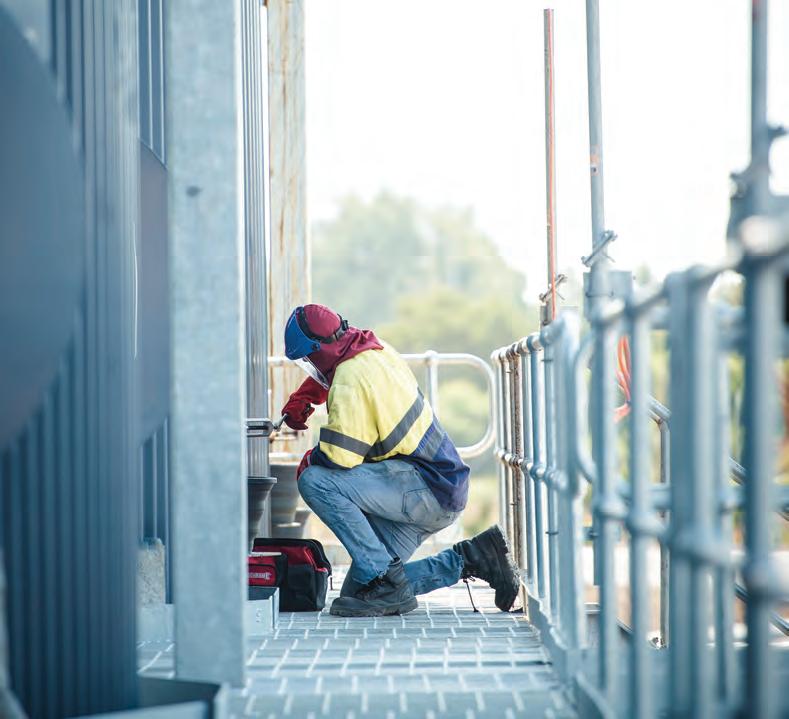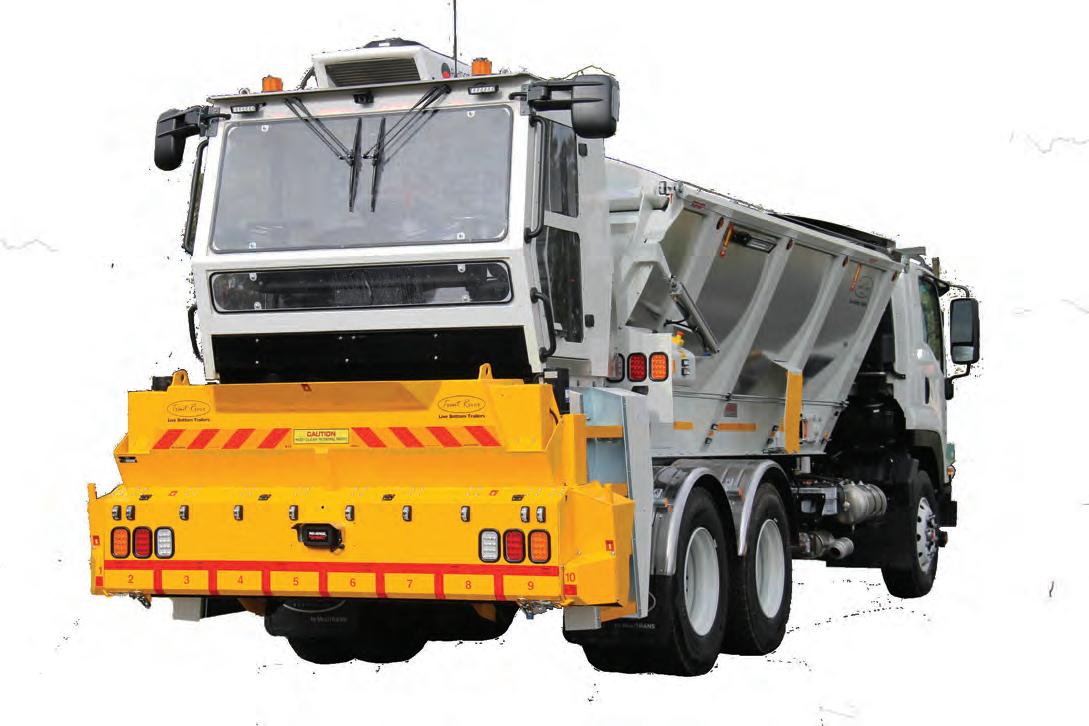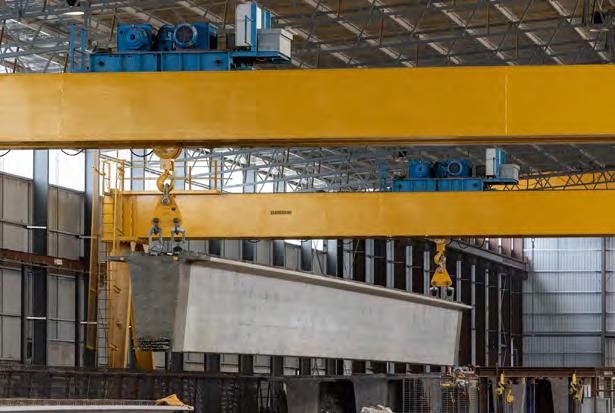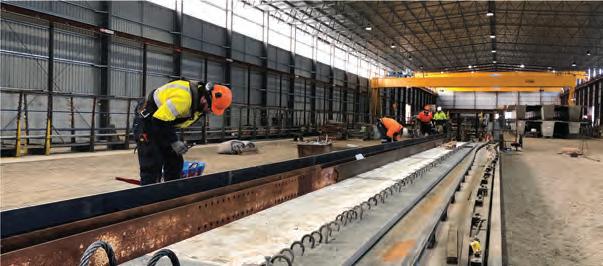
6 minute read
EME2 production
INVESTING IN EME2
TAPPING INTO THE EXPERIENCE AND CAPABILITIES OF COLAS GLOBAL GROUP, SAMI BITUMEN HAS SIGNIFICANTLY INVESTED IN RESEARCH, BY CONTRIBUTING TO THE DEVELOPMENT OF THE EME2 TECHNOLOGY TO HELP FACILITATE THE TECHNOLOGY TRANSFER AS A HIGH PERFORMANCE STRUCTURAL BASE COURSE FOR AUSTRALIA.
Enrobé à Module Élevé Class 2 or (EME2) asphalt was originally developed in France in the early 1990s and is currently widely used across the world. It has been used in more recent years in Southern Hemisphere countries like South Africa, Reunion, Mauritius and New Caledonia.
EME2 is a high modulus asphalt base course yielding very high stiffness, durability and significantly improved pavement performance.
In 2017, an Austroads report found more than 28,000 tonnes of EME2 had been laid across Australia and since then its popularity and demand has continued to increase.
The report stated that EME2 mix incorporates a very hard paving grade bitumen with a relatively high binder content, at around six per cent by mass.
To facilitate the usage of this generic structural asphalt material into Australia, SAMI Bitumen Technologies invested in binder engineering technology. It also worked closely with contractors and Australian road authorities to duplicate
SAMI’s EME2 is produced at its specialist Port-of-Brisbane facility.
the same performance expectations as achieved in France.
Key to the production of EME2 asphalt is having bitumen with the right binder properties which will ensure that the asphalt can achieve the target performance properties.
SAMI Bitumen Technologies is now a producer of EME2 binder in Australia, with most of the company’s product manufactured in a specialist facility at Portof-Brisbane in Queensland. SAMI has also recently commissioned a specialised facility in Kwinana so it could also supply the hard grade of bitumen to the Western Australian market.
Phil Stevens, SAMI’s Queensland State Manager says that the facility is home to an oxidising column which is generally required for obtaining a range of bitumen classes.
“Oxidisation changes the properties of the bitumen to a higher, stiffer grade in a controlled way. The idea is to be able to obtain stiffer grades of bitumen without detrimentally impacting on their quality,” he says.
“At our Port-of-Brisbane facility, we generally receive one grade of bitumen that we subsequently engineer into the range of grades that the market requires.”
Stevens says that in order to ensure the right oxidising parameters and conditions are being met, the experienced SAMI team consistently monitor the binder throughout the oxidation process.
“We are testing the product as it is discharged from the cargo vessel, in-line, in our storage tanks on-site, as it moves through the preheating stage, into the blowing column and then right through to the industrial base product that is produced. Then we test it as it is corrected and finetuned to obtain the finished product, which is then finally tested for compliance.”
“That isn’t even where the quality monitoring finishes, as samples of the binder are taken at the point of loading into the road tanker, at point of delivery at the asphalt plant and from the mix production tank. For EME2 the constant quality focus is intense.”
Stevens says that fundamentally, it is the expertise of the SAMI team at the Port-ofBrisbane that ensures a quality final product.
“SAMI is able to consistently provide quality bitumen so that an asphalt contractor can always be assured the EME2 mix they manufacture will reflect mix design performance properties. That is due to the quality of the base bitumen we use, the state-of the-art equipment and our experienced and well-trained people.”
Iulian Man, SAMI’s Technical Services Manager, says SAMI Bitumen Technologies’ EME2 binder must meet stringent binder specifications but also it has to impart certain characteristics to the EME2 mix in order to meet the performance based specification.
“When EME2 technology was first introduced to Australia, the European specification for EME2 was implemented locally by the road authorities and through intense research and resource allocation, we managed to create an EME2 binder that met
the full table of specifications,” Man says.
SAMI began their work to develop an EME2 binder for Australia in 2011 and together with other stakeholders from industry and government undertook the first EME2 demonstration trial in Queensland in 2014, which proved to be successful.
Since then, SAMI has been active in offering support to the asphalt contractors by conducting EME2 mix designs using local test methods and validating these mix designs in COLAS’s Central laboratory in Paris against the French standards.
One of the key advantages of EME2 is that locally available asphalt aggregates can be used in order to achieve a complying mix design. This means that the asphalt producer does not need to source special aggregates or provide additional equipment to produce EME2 asphalt.
EME2 is a generic product and AAPA have published a model specification to mimic the French standards for EME2 which has been used as the basis for other State Road Authority specifications. The mix design protocols and specification requirements have been adapted to Australian conditions.
Q-FE
TM ROAD ANT
Man says the EME2 base course is highly recommended in heavy and very heavy traffic environments, including airport pavements. He says the high stiffness and resilience of an EME2 base course can lead to a reduction in the design thickness to achieve quality structural performance.
“With EME2, the thickness of a base course layer may be reduced by up to 30 per cent when compared with a standard asphalt base course mix. This means that there is no need to use the same volume of construction materials and also dispose of less overburden materials, resulting in cost and environmental benefits,” Man says.
He says that alternatively, the choice may be that the thickness of the EME2 base course can be designed at the same thickness with that of a conventional mix course but with a longer expected design life.
“Ultimately, it is about the success of our clients, the stakeholders and the taxpayer because of the performance, economy in resources and the environmental benefits.”
Investing in core technologies to produce the specialised EME2 binder has been integral to SAMI Bitumen Technologies’

commitment to the market and community and the company will continue to invest in expanding and improving these capabilities. This includes a large investment in resourcing SAMI’s Sydney laboratory with asphalt performance testing equipment and a laboratory scale blowing column.
“We already operate several oxidising columns at our facilities across the country with further capacity in the pipeline,” Man says.
“If you produce a EME2 binder only in Queensland for instance and it is needed for a project in Western Australia or Victoria, there is a significant transport cost and therefore we have to respond fast and in a cost-effective way to the market demands. As a consequence, we have made significant investment in equipment so that we can effectively supply EME2 binder across the country.”
SAMI Bitumen Technologies has already seen major growth in demand for its EME2 binder in Queensland and their expansion of EME2 binder production capabilities is expected to see its usage grow in other areas of the country.
Quality Fabrication & Engineering 36 Selby Rd Woori Yallock Vic
Contact +613 5955 0000 Email sales@qualityfab.com.au
Proudly Providing Precast Concrete Solutions to the Civil Construction Industry


We pride ourselves on working with our clients to provide quality products to specification, to schedule and within budget.

Our purpose built manufacturing facility specialises in all prestressed and precast concrete products including T-Beams, L-Beams, PSC Planks, PSRC Piles, Headstocks and
columns.
We offer:
Large scale pre tensioning casting beds and capacity for full mould development for bespoke precast concrete elements
Large lift capacities and transport solutions Ancillary works such as anti-graffiti coating and specialist treatments Barrier rail and hand rail fabrication and installation A team of Drafters, Engineers, Technical Specialists and Designers
We are VicRoads prequalified to R3, B3 and F20, RMS prequalified to C2 Complex prestressed concrete products. We hold ISO certifications to 9001 (Quality), 14001 (Environment) and 4801 and 45001 (Safety).










